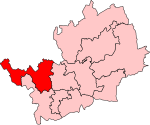North Hertfordshire (UK Parliament constituency)
| North Hertfordshire | |
|---|---|
| Former county constituency for the House of Commons | |
 North Hertfordshire in Hertfordshire, showing boundaries used from 1983-1997 | |
| County | Hertfordshire |
| Major settlements | Letchworth and Hitchin |
| 1983–1997 | |
| Seats | One |
| Created from | Hitchin |
| Replaced by | North East Hertfordshire, Hitchin and Harpenden |
North Hertfordshire was a parliamentary constituency in Hertfordshire. It returned one Member of Parliament (MP) to the House of Commons of the Parliament of the United Kingdom by the first-past-the-post system.
History
The constituency was created for the 1983 general election, and abolished for the 1997 general election. It was formed from the bulk of the abolished constituency of Hitchin. On abolition, western areas, including Hitchin, formed part of the new constituency of Hitchin and Harpenden. Remaining parts, including Letchworth, Baldock and Royston, formed the majority of the new constituency of North East Hertfordshire.
It was a safe Conservative seat for its entire existence. Its first MP, Ian Stewart, previously held the old marginal seat of Hitchin, and its second and last, Oliver Heald, currently represents North East Hertfordshire.
Boundaries
- The District of North Hertfordshire wards of Arbury, Ashbrook, Baldock, Bearton, Cadwell, Grange, Highbury, Hitchwood, Hoo, Kimpton, Letchworth East, Letchworth South East, Letchworth South West, Newsells, Offa, Oughton, Priory, Royston East, Royston West, Sandon, Walsworth, Weston, and Wilbury.[1]
The three main towns in the constituency were Hitchin, Letchworth, and Royston.
Members of Parliament
| Election | Member[2] | Party | |
|---|---|---|---|
| 1983 | Ian Stewart | Conservative | |
| 1992 | Oliver Heald | Conservative | |
| 1997 | constituency abolished: see North East Hertfordshire & Hitchin and Harpenden | ||
Election results
Elections in the 1980s
| Party | Candidate | Votes | % | ±% | |
|---|---|---|---|---|---|
| Conservative | Ian Stewart | 29,302 | 49.0 | ||
| Liberal | George Binney | 19,359 | 32.4 | ||
| Labour | James Reilly | 11,104 | 18.6 | ||
| Majority | 9,943 | 16.6 | |||
| Turnout | 59,765 | 79.2 | |||
| Conservative win (new seat) | |||||
| Party | Candidate | Votes | % | ±% | |
|---|---|---|---|---|---|
| Conservative | Ian Stewart | 31,750 | 49.7 | +0.7 | |
| Liberal | George Binney | 20,308 | 31.8 | −0.4 | |
| Labour | Alan Gorst | 11,782 | 18.5 | −0.1 | |
| Majority | 11,442 | 17.9 | +1.3 | ||
| Turnout | 63,840 | 81.1 | +1.9 | ||
| Conservative hold | Swing | ||||
Elections in the 1990s
| Party | Candidate | Votes | % | ±% | |
|---|---|---|---|---|---|
| Conservative | Oliver Heald | 33,679 | 49.8 | +0.1 | |
| Liberal Democrats | Roger Liddle | 17,148 | 25.4 | −6.4 | |
| Labour | Sarah Bissett-Johnson | 16,449 | 24.3 | +5.9 | |
| Natural Law | Bryan Irving | 339 | 0.5 | New | |
| Majority | 16,531 | 24.4 | +6.5 | ||
| Turnout | 67,615 | 84.4 | +3.3 | ||
| Conservative hold | Swing | ||||
See also
Notes and references
- ^ "The Parliamentary Constituencies (England) Order 1983". Government of the United Kingdom. Retrieved 25 February 2019.
- ^ Leigh Rayment's Historical List of MPs – Constituencies beginning with "H" (part 3)
- ^ "Election Data 1983". Electoral Calculus. Archived from the original on 15 October 2011. Retrieved 28 June 2017.
- ^ "Election Data 1987". Electoral Calculus. Archived from the original on 15 October 2011. Retrieved 28 June 2017.
- ^ "Election Data 1992". Electoral Calculus. Archived from the original on 15 October 2011. Retrieved 28 June 2017.
- ^ "Politics Resources". Election 1992. Politics Resources. 9 April 1992. Archived from the original on 24 July 2011. Retrieved 6 December 2010.
